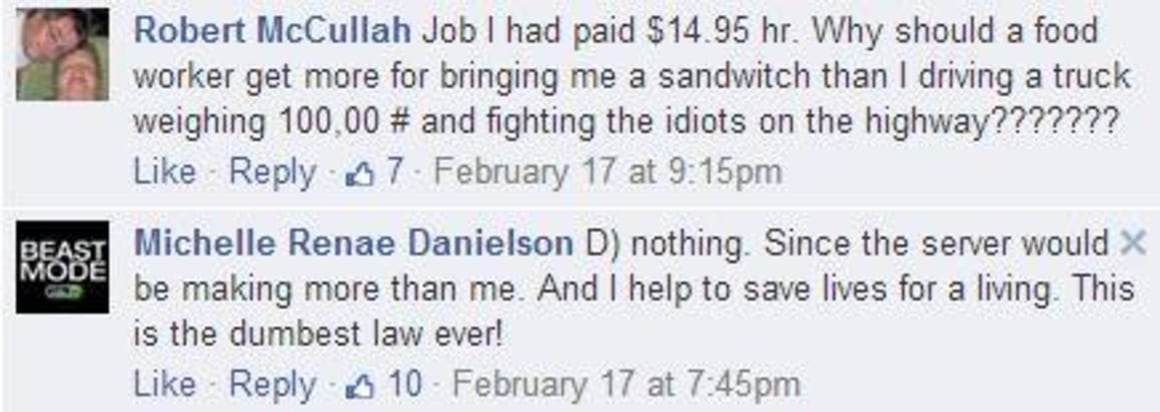Raise the Minimum Wage? Some Foes Say They'll Stop Tipping
There's a surprise side order of sourpuss getting served up in the national argument over raising the minimum wage: discontented workers say they'll stop tipping when they go out to eat.
The surprise battleground is Seattle, where a movement to raise the minimum wage -- at $9.32, already one of the highest in the country -- to $15, is seen as setting the tone for the nationwide discussion. The city's effort makes President Obama's push for increasing the federal minimum wage from $7.25 to $10.10 appear modest in comparison. As Washington guarantees the state's full minimum wage for servers, who would continue to make tips on top of it, the drive has pitted the lower middle class against the working class who serve them food.
"I operate heavy machinery and make that... how does a fry cook get that?" said Carole Holfeld, a 39-year-old forklift operator and single mother from Tacoma, Wash. Making $16 an hour at Mega Brands, where she's worked for seven years, she doesn't think waiters deserve to make more than she does. What if the minimum wage is raised to $15? "Zero tip," she said.
But servers say they rely on tips to make ends meet. The federal "tipped minimum wage," the minimum wage required to be paid to tipped employees - set lower to reflect extra income from customer tips that can equal or exceed the federal minimum wage - is $2.13 per hour. (If a tipped employee doesn't make enough from their wage plus tips to equal the federal minimum wage, their employer is required to make up the difference.) A recent report by the Congressional Budget Office said that if the federal minimum wage were raised to $10.10, it would result in job losses of 0.3 percent and raise 2 percent of the population out of poverty. And according to a 2011 study by the Economic Policy Institute, a liberal think tank, compared to 6.3 percent of all workers, 16.7 percent of tipped waiters fall below the poverty line.
“Why would I tip someone making as much as me for doing their job? Nobody tips me for doing mine!”
Some customers don't think that's their problem.
"Anybody trying to have a family on minimum wage needs to have their head examined," said Jan F., a 47-year-old part-time dog sitter and print broker in Seattle. Based on her experience working in a pizza parlor when she was 18, she believes jobs waiting tables are stepping stones to the adult world and don't deserve a $15 per hour rate, plus tips.
"This is the age of entitlement and a wake-up call is badly needed," she said.
Over 3,200 comments flooded the Facebook wall of local news station KIRO 7 after they asked, "If you knew a restaurant server was making $15/hour, what tip would you give? A - 15-20%, always B - 15-20%, unless the service was awful C - 10% or less D - No tip, ever E- Other." Viewers weighed in on all sides, but a persistent thread replied "D."


Besides simmering class rage, the discussion exposes a quandary: why do we tip?
Tipping customs vary by country. Some don't tip at all. Do we tip just to be nice? Are tips to make up for low wages? Are diners the deputies of busy restaurant owners, rewarding and punishing employee performance?
Fogel says she tips servers who hustle. Holfeld says she tips well at her favorite restaurants near her home. Michael Lynn, an adjunct professor at the Cornell University School of Hotel Administration and an expert on tipping, says that we tip out of guilt.
"It's expected and they don't want to risk disapproval for failure to comply with social norms," said Lynn.
That said, according to an unpublished study by Lynn analyzing state by state tipping patterns, customers tend to tip less in states where the tipped minimum wage is higher.
But untangling the reason why tips vary based on a state's tipped minimum wage isn't straightforward.
"Is the high tip minimum wage causing people to say, 'Hey, maybe they don't need my money so much,'" said Lynn, "or do state legislators say, 'Hey, we don't tip so much,' and then raise the tipped minimum wage?"
Low wages, however, aren't the biggest driver of big tips. Neither is service.
While you'll often hear people talk about how they vary tip percentage based on server performance - for instance, they normally give 20 percent or more for superior service, and 10 to 15 percent for poor service - Lynn's research shows there's only a 4 percent correlation between actual quality of service and tip percentage.
"The biggest factor that influences tips is the social connection between server and customer. Doing things like squatting can make you appear closer. Smiling, calling customer by name, increase the social connection, which make the customer care more about what the server thinks about them," said Lynn. "All these variables that increase the social connection have a substantial impact on tips."
The fight over whether to tip if the minimum wage rises for waiters then comes down to a personality contest. One that some Seattle waiters might start losing if working class and lower middle class customers get grumpy that their servers might make more than they do.

No comments:
Post a Comment